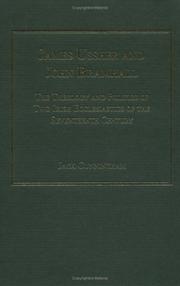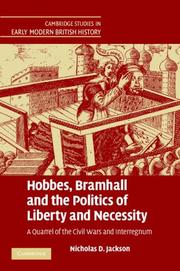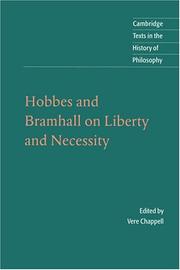| Listing 1 - 3 of 3 |
Sort by
|

ISBN: 1138356220 135112675X 1351125613 1281104280 9786611104283 0754684318 9780754684312 0754655660 9780754655664 9780839188036 9781351126755 1351125990 Year: 2007 Publisher: Aldershot, England Burlington, VT Ashgate
Abstract | Keywords | Export | Availability | Bookmark
 Loading...
Loading...Choose an application
- Reference Manager
- EndNote
- RefWorks (Direct export to RefWorks)
"This book examines the lives of two leading Irish ecclesiastics, James Ussher (1581-1656) and John Bramhall (1594-1663). Both men were key players in the religious struggles that shook the British Isles during the first half of the seventeenth century, and their lives and works provide important insights into the ecclesiastical history of early modern Europe. As well as charting the careers of Ussher and Bramhall, this study introduces an original and revealing method for examining post-Reformation religion. Arguing that the Reformation was stimulated by religious impulses that pre-date Christianity, it introduces a biblical concept of 'Justice' and 'Numinous' motifs to provide a unique perspective on ecclesiastical development. Put simply, these motifs represent on the one hand, the fear of God's judgement, and on the other, the sacred conception of the fear of God. These subtle understandings that co-existed in the Catholic church were split apart at the Reformation and proved to be separate poles around which different interpretations of Protestantism gathered. By applying these looser concepts to Ussher and Bramhall, rather than rigid labels such as Arminian, Laudian or Calvinist, a more subtle understanding of their careers is possible, and provides an altogether more satisfactory method of denominational categorisation than the ones presently employed, not just for the British churches but for the history of the Reformation as a whole."--Provided by publisher.
Ussher, James, --- Bramhall, John, --- Bramble, --- Bramhell, --- Branhall, John, --- Author of The vindication of the clergy, --- Vindication of the clergy, Author of the, --- Derrie, --- John, --- Bramhall, --- Bromwell, John, --- Londonderry, --- Usher, James, --- Usserius, Jacobus, --- James, --- Usher, Jago, --- Usher, --- Ireland --- Irish Free State --- Church history

ISBN: 9780521181440 9780521870061 0521870062 9780511495830 9780511355554 0511355556 0511354487 9780511354489 0511495838 1107179750 1281153338 9786611153335 0511353901 1139132555 0511355033 0521181445 Year: 2007 Publisher: Cambridge [etc.] Cambridge University Press
Abstract | Keywords | Export | Availability | Bookmark
 Loading...
Loading...Choose an application
- Reference Manager
- EndNote
- RefWorks (Direct export to RefWorks)
This book was the first full account of one of the most famous quarrels of the seventeenth century, that between the philosopher Thomas Hobbes (1588-1679) and the Anglican archbishop of Armagh, John Bramhall (1594-1663). This analytical narrative interprets that quarrel within its own immediate and complicated historical circumstances, the Civil Wars (1638-49) and Interregnum (1649-60). The personal clash of Hobbes and Bramhall is connected to the broader conflict, disorder, violence, dislocation and exile that characterised those periods. This monograph offered not only the first comprehensive narrative of their hostilities over two decades, but also an illuminating analysis of aspects of their private and public quarrel that have been neglected in previous accounts, with special attention devoted to their dispute over political and religious authority. This will be of interest to scholars of early modern British history, religious history and the history of ideas.
Hobbes, Thomas --- Bramhall, John --- Bramhall, John, --- Free will and determinism. --- Political science --- History --- Hobbes, Thomas, --- Great Britain --- Compatibilism --- Determinism and free will --- Determinism and indeterminism --- Free agency --- Freedom and determinism --- Freedom of the will --- Indeterminism --- Liberty of the will --- Determinism (Philosophy) --- Bramble, --- Bramhell, --- Branhall, John, --- Author of The vindication of the clergy, --- Vindication of the clergy, Author of the, --- Derrie, --- John, --- Bramhall, --- Bromwell, John, --- Londonderry, --- Gobbs, Tomas, --- Hobbs, Thomas, --- Gobbes, Tomas, --- T. H. --- H., T. --- Hobs, Thomas, --- Hobbes, --- Hobbes, Thom. --- Hobbius, Thomas, --- Hobbuzu, Tomasu, --- Huobusi, --- Hobbs, Tho. --- הובס, תומס, --- 霍布斯, --- ホッブズ, トマス, --- Arts and Humanities

ISBN: 1107114489 0511009860 1280429321 1139164201 0511172117 0511150164 0511324618 0511050178 9780511009860 9780521593434 0521593433 9781139164207 0521596688 9780521596688 9780511150166 9781107114487 9781280429323 9780511172113 9780511324611 9780511050176 Year: 1999 Publisher: Cambridge, U.K. ; New York : Cambridge University Press,
Abstract | Keywords | Export | Availability | Bookmark
 Loading...
Loading...Choose an application
- Reference Manager
- EndNote
- RefWorks (Direct export to RefWorks)
Do human beings ever act freely, and if so what does freedom mean? Is everything that happens antecedently caused, and if so how is freedom possible? Is it right, even for God, to punish people for things that they cannot help doing? This volume presents the famous seventeenth-century controversy in which Thomas Hobbes and John Bramhall debate these questions and others. The complete texts of their initial contributions to the debate are included, together with selections from their subsequent replies to one another and from other works of Hobbes, in a collection that offers an illuminating commentary on issues still of concern to philosophers today. The volume is completed by a historical and philosophical introduction that explains the context in which the debate took place.
Free will and determinism. --- Compatibilism --- Determinism and free will --- Determinism and indeterminism --- Free agency --- Freedom and determinism --- Freedom of the will --- Indeterminism --- Liberty of the will --- Determinism (Philosophy) --- Hobbes, Thomas, --- Bramhall, John, --- Bramble, --- Bramhell, --- Branhall, John, --- Author of The vindication of the clergy, --- Vindication of the clergy, Author of the, --- Derrie, --- John, --- Bramhall, --- Bromwell, John, --- Londonderry, --- Contributions in concept of free will and determinism. --- Hobbes, Thomas --- Gobbs, Tomas, --- Hobbs, Thomas, --- Gobbes, Tomas, --- T. H. --- H., T. --- Hobs, Thomas, --- Hobbes, --- Hobbes, Thom. --- Hobbius, Thomas, --- Hobbuzu, Tomasu, --- Huobusi, --- Hobbs, Tho. --- הובס, תומס, --- 霍布斯, --- ホッブズ, トマス, --- Arts and Humanities --- Philosophy
| Listing 1 - 3 of 3 |
Sort by
|

 Search
Search Feedback
Feedback About UniCat
About UniCat  Help
Help News
News